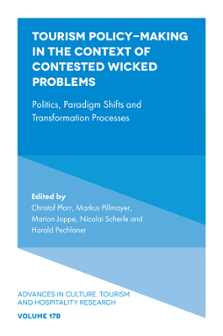
Index
ISBN: 978-1-83549-985-6, eISBN: 978-1-83549-984-9
ISSN: 1871-3173
Publication date: 9 September 2024
Citation
(2024), "Index", Pforr, C., Pillmayer, M., Joppe, M., Scherle, N. and Pechlaner, H. (Ed.) Tourism Policy-Making in the Context of Contested Wicked Problems: Politics, Paradigm Shifts and Transformation Processes (Advances in Culture, Tourism and Hospitality Research, Vol. 17B), Emerald Publishing Limited, Leeds, pp. 339-350. https://doi.org/10.1108/S1871-31732024000017B021
Publisher
:Emerald Publishing Limited
Copyright © 2024 Christof Pforr, Markus Pillmayer, Marion Joppe, Nicolai Scherle and Harald Pechlaner
INDEX
- Prelims
- Chapter 1. Interrogating Tourism and Hospitality's Wicked Employment Issues Through the Lens of Paradox Theory
- Chapter 2. Wicked Contexts Pushing for Change in Argentina: Tourism, Labour Informality and PreViaje Policy
- Chapter 3. 50 Years UNESCO World Heritage Convention: Curse or Cure?
- Chapter 4. Tourism Policymaking in Finland: A Multilevel Governance Perspective
- Chapter 5. Only Those Who Can Shout Loud Enough Will be Heard? Tourism Lobbying in a Turbulent World of Wicked Problems in Germany
- Chapter 6. Bulgarian Tourism Policy: Intentions versus Reality
- Chapter 7. Indigenous Tourism Policy: A Perspective from Australia
- Chapter 8. Indigenous Tourism and Political Recognition of Rights in Chile
- Chapter 9. Politics of Migration and Tourism in the Gambia
- Chapter 10. The Trajectory of Public Tourism Policies in Brazil (1922–2022): From Wicked Problem to a Geopolitical Strategy?
- Chapter 11. Towards Social Innovation Governance in Developing Country Destinations: A Comparative Analysis Between Tourism Ecosystems in Azerbaijan and Ecuador
- Chapter 12. Nothing About Us without Us: Citizens' Role in Urban Tourism Policy-making
- Chapter 13. Socio-Political Dynamics of Airbnb and the Platform Economy
- Chapter 14. Gender Inequity in Tourism: A Policy Challenge
- Chapter 15. More Than Just Anti-discrimination Policy: Conceptual Reflections on the Strategic Benefits of Diversity Management in Tourism
- Chapter 16. When Policy Conflicts with the Data Science: Predicting the Cost Overrun of the 2032 Brisbane Olympic Games
- Conclusion
- Chapter 17. Addressing Wicked Problems Through Integrated Policy-making: An Ecosystem-based Approach
- Chapter 18. Tourism Policies Reloaded: Towards a Comprehensive Framework
- Chapter 19. Wicked Problems as Trigger for Transformation Processes
- Index